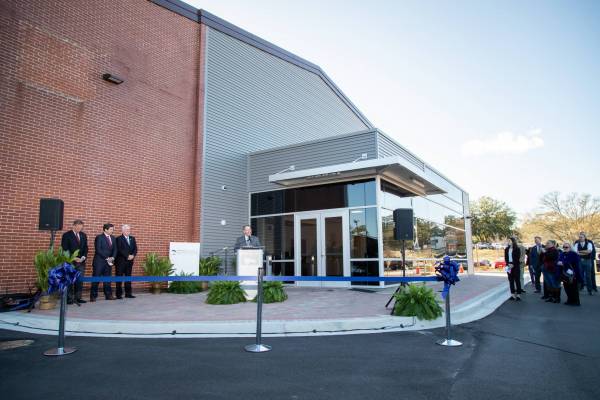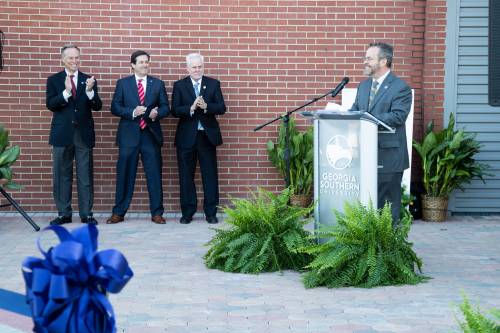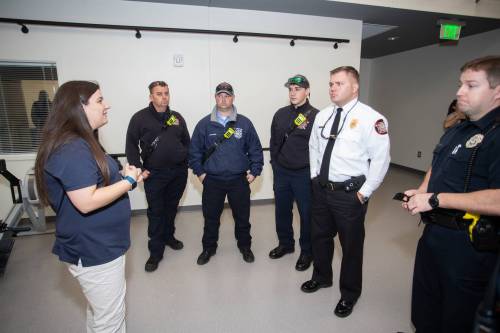
A long-vacated pool space in the University’s Hanner Fieldhouse complex has been renovated into state-of-the-art laboratories that will help athletes, first responders and people with disabilities avoid injuries, strengthen performance and improve their quality of life.
Georgia Southern’s new Kinesiology Research Laboratories on the Statesboro Campus is the only facility of its kind in the region, enabling students and faculty to conduct leading human movement research while improving the quality of healthcare in southeast Georgia.
“The technology available to students in this newly renovated space is second to none in the region, but more importantly, the research being done here is having a significant impact on the field of kinesiology, and on real, everyday people,” said Georgia Southern President Kyle Marrero. “This building will expand the facilities and capabilities of Georgia Southern, but it will also expand the firsthand experience of our students.”
University System of Georgia Regents Don L. Waters and C. Everrett Kennedy, III, helped cut the ribbon on the facility in a ceremony last week.
During the ceremony, Dean of the Waters College of Health Professions Barry Joyner, Ph.D., congratulated and thanked the faculty and students of the health sciences and kinesiology department.
“You have demonstrated your capabilities and this new facility is an investment in you,” he said.
The renovated space boasts four labs — two biomechanics labs, a motor control lab and a human performance lab. Each lab will provide a space for undergraduate students, graduate students and student interns to have the opportunity to conduct ongoing research, preparing them for an exciting career after graduation.
In the biomechanics labs, students will be able to work alongside world-class faculty as they monitor University athletes at risk for concussion and help others recover. They will also conduct important gait research, monitoring changes in gait over long-distance runs, as well as the effects of different athletic shoe types on gait mechanics.
In the human performance laboratory, faculty and students are conducting tactical assessments on firefighters and law enforcement, helping them avoid injury; and working with players on the professional soccer team, Tormenta.
In the motor control laboratory, faculty and students are working with cerebral palsy patients to combat the painful symptom of spasticity and provide training programs to improve their strength and quality of life.
The facility also includes patient consulting rooms so that area physicians can use the facility for their patients, and to learn from the research.
A desire to continue to learn and improve the quality of life for others drives students like Sarah Creveling, a senior studying exercise science.
“These new Hanner Research Labs are equipped with the technology that I and my peers need in order to seek new ways to improve the lives of people with disabilities,” said Creveling. “With this space, equipment and tools that we now have at our disposal, myself and many other students and faculty members will be able to perform research that will impact not only this field, but also our community.”
She plans to apply to the Master of Science in Kinesiology program with a concentration in exercise science in the hopes of continuing her research in a student-centered environment.
Georgia Southern now represents 20% of all undergraduate healthcare profession graduates in Georgia — almost one out of every five in the state. The University is committed to meeting Georgia’s demand for more healthcare professionals, and the Hanner renovation project takes another step in addressing this crucial need.
Approximately 11,000 square feet of space was renovated and life safety issues in the complex were addressed through the $5 million project. Renovating the unused space in Hanner provided the much-needed facility to create custom-designed research labs and returned the retrofitted space that temporarily housed some labs to a gymnasium for University athletic department and instructional use. Funding was provided through the state of Georgia.
The civil engineering and architectural firm Hussey, Gay and Bell designed and created the most efficient use of the space, and general contractor Sheridan Construction completed the construction.


Chattooga Opinions
Medically Supervised Weight Loss: Inside Premier Weight Loss & Medispa

Chattooga Local News
Georgia Power Files Plan for Customer Rate Decrease with Public Service Commission

Chattooga Local Government
Carr Pushes for Permanent Halt of Medicare and Medicaid Funding for Child Sex-Change Procedures

Bulloch Public Safety
02/20/2026 Booking Report for Bulloch County

Bulloch Public Safety
01/26/2026 Booking Report for Bulloch County

Bulloch Public Safety
02/09/2026 Booking Report for Bulloch County

Bulloch Public Safety
02/16/2026 Booking Report for Bulloch County

Bulloch Public Safety
02/02/2026 Booking Report for Bulloch County

Bulloch Public Safety
01/30/2026 Booking Report for Bulloch County








